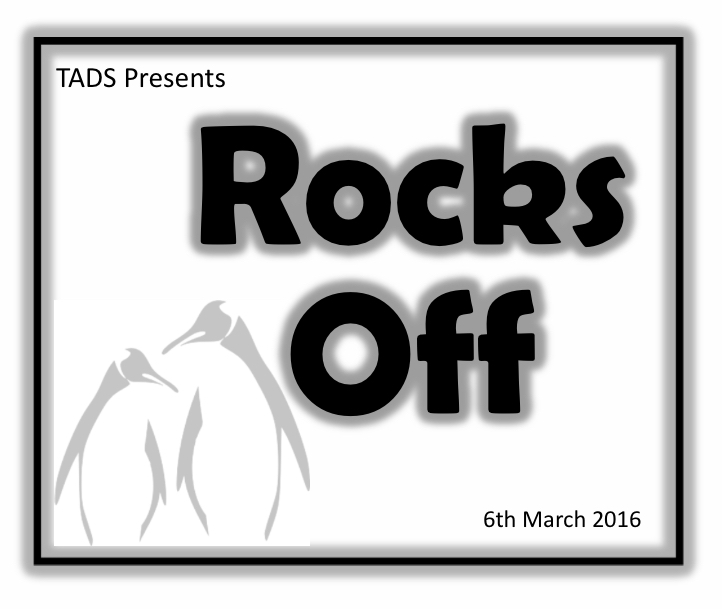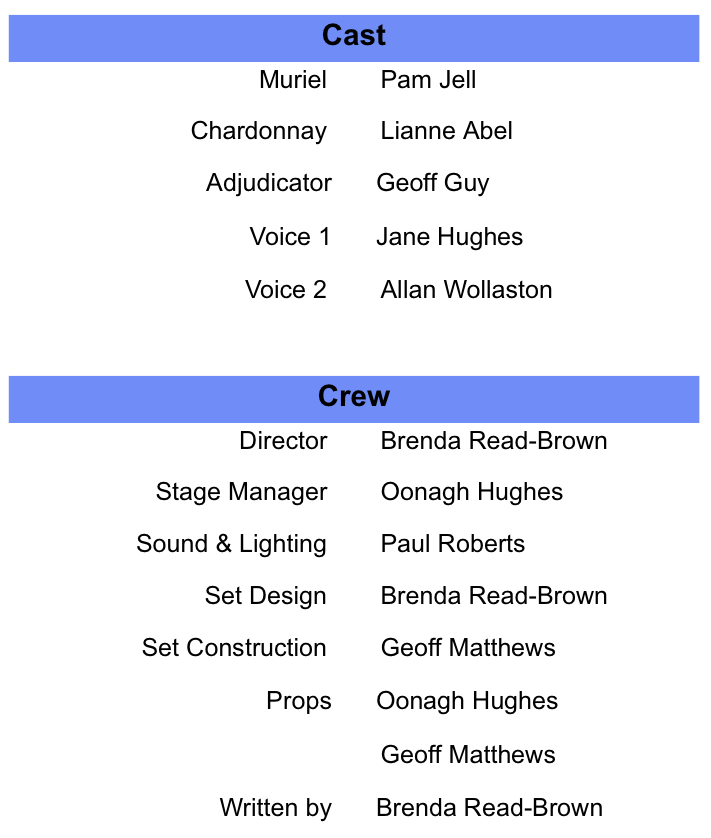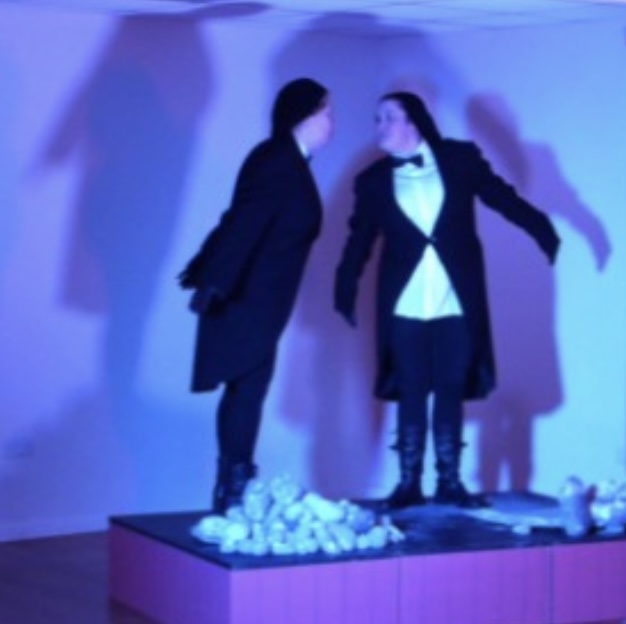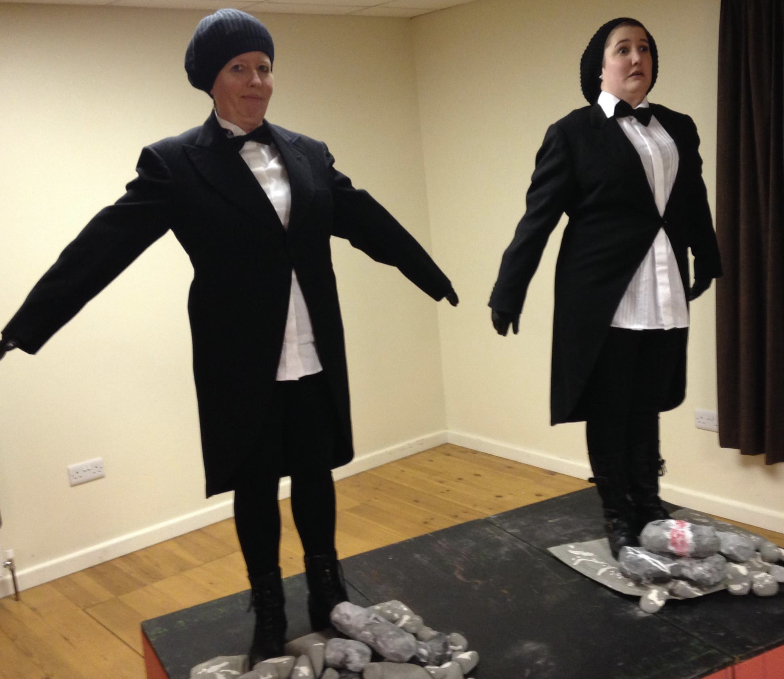



An original play by TADS’ very own Brenda Read-Brown.
This production was entered into the Worcestershire Drama Festival 2016.
It won the award for Best Comedy, and a nomination for Best Set.
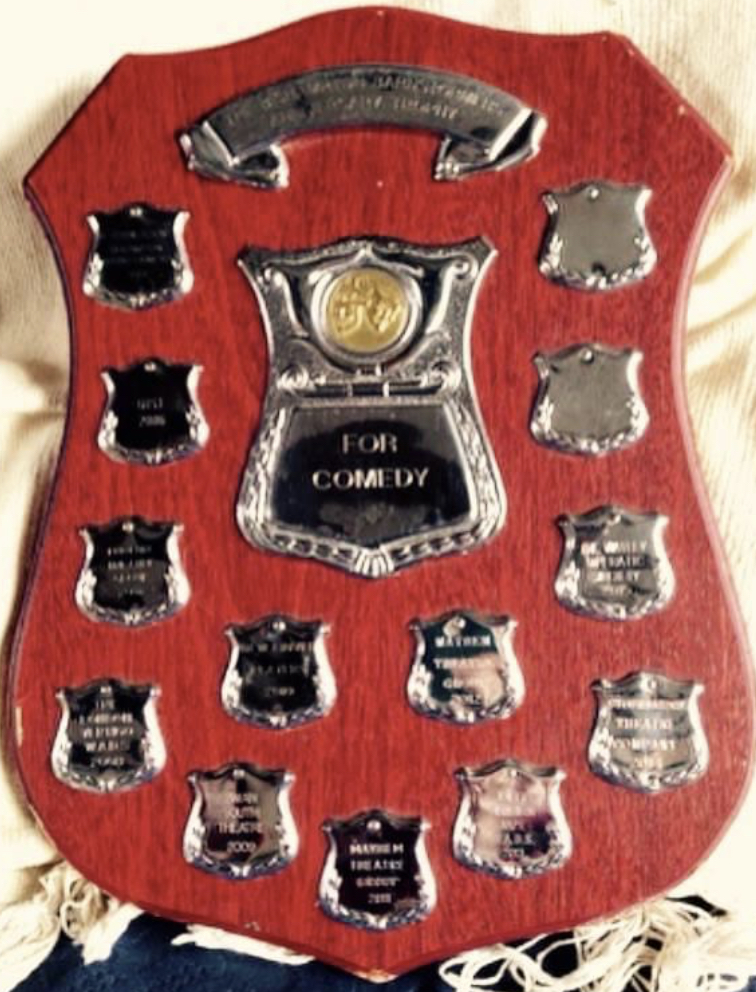
The plot: It is the last play in the one-act play festival, and the beleaguered Adjudicator has not read the script. His conscience nags at him, but his real inner self feels that he has had to put up with a great deal, considering the nature of the plays he has sat through so far.
The play starts, with the deliberate management of a pause. Soon the Adjudicator realises that the two characters, Muriel and Chardonnay, represent penguins, in a heavy-footed allegorical drama.
The Adjudicator finds a note in the script addressed to him. He manages to read it, while watching the play and writing comments. It is from the director of the play, offering herself to him in exchange for an award. He is tempted, thinking he knows who has made the offer, and his comments change direction. But then he realises that the director is also the woman playing the part of Muriel, and his enthusiasm wanes.
Driven to distraction by this need for prizes, and by the repetitive dialogue in the play, he eventually bursts into a rant, and storms from the theatre, leaving the hapless penguins to bring everything to a conclusion.
I’ve wanted to do a play with penguins in for a long time. It’s the only play where I’ve been to the zoo to do research, and the cast made it all worth while.
Brenda Read-Brown, Writer and Director
The full GODA adjudication:
THE PLAY
The group is fortunate to have the writer within their own midst. Brenda Read-Brown has had success in the AETF playwriting competition in the past and is also a poet – in fact Poet Laureate of Gloucestershire. She is also a performance artist and has had many varied subjects in her commissioned work of various kinds. Examples are: cancer, railways, shoe shops, litter, launderettes. football fans and betting shops.
Here we have a scurrilous and highly far-fetched account of an adjudicator at work – exaggerated for comic purposes obviously. There are a number of plays about adjudicators and I even helped develop one with a well-known writer where at the very end he asks for sexual favours. The comedy in this version should come from the tension between the high-flown pompous stuff he’s writing and the sardonic alternative view of his inner voices. There should also be some visual comedy from the absurdist subject matter of actors dressed up as penguins and mouthing their words.
PRESENTATION
There was an angled small rostrum stage on the left for the penguins to rest on their rocks, which seemed to be on quick inspection when I was passing by later, partly genuine smaller ones and some artificial larger ones to be brought in by the nesting penguin. The name given in the programme was Geoff Matthews so he is to be congratulated on a realistic product which was easy enough for the actors to handle. I thought about whether they could have been arranged on the floor itself for even greater simplicity but was glad that you had provided a raised stage because it suggested a divide between the actors and the adjudicator and also provided moments of physical humour when Chardonnay hopped on and off and waddled away.
The adjudicator’s desk was then angled across the right hand side of the stage with an excellent effect of a couple of tipping theatre seats behind the desk. Well done indeed on that detail. On either side of the double desk were places where the voices or spirits could perch close to him and slightly higher, able to offer advice or criticism. The costume was well chosen and the three of them were connected by the colour scheme of electric blue silken cloth items, a cravat for him, a hair ribbon for Voice 1 and a tie for Voice 2. The two voices were a basic black beneath those splashes of colour and the adjudicator made a strong impact with his white DJ. The penguins looked comic but serious in the way that real penguins do in their tail coats over white bibs, black trousers and socks.
The lighting enhanced the movement of the play by having each area in a pool of light with the ability to focus the audience attention from one to the other when required, although sometimes, of course, the areas were in action at the same time and overlapping. The music suggested was the Penguin Café Orchestra or Sinfonia Antarctica and although I am not sure whether either of them was what you used, the opening music was atmospheric enough.
PRODUCTION
The opening picture was both intriguing and amusing as the intense and flowery gestures of the adjudicator were recognisable. The early exchanges of the voices established the basic conceit that here we had two aspects of his mind that were at odds with each other and that we could listen in on his inner thoughts raging back and forth while he maintained an elegant exterior. The placing of the voices was rather like the good and bad spirits which tempt the protagonist in medieval morality plays.
In order for the picture not to remain too static, the voices broke away from the desk and sometimes met in front of it to battle out their different views. Voice 1 also was more likely to core and sit in front of the stage watching the action intently before going back to his shoulder. The exchanges between the two were reasonably well charged with energy to make the text interesting.
One area, though, where voice 2 especially could go further in raising the tempo is in quoting the words that are being written as the action on stage unfolds. If it could be ‘quoted’ more heavily, giving it real weight and fluency and even pomposity, then we could see it for what it is – a load of tosh. Similarly, when the letter was delivered, there could have been more made of the build-up of mystery contained within it with glances between the voices or at the adjudicator as we gradually realise where the letter is heading and the information about the rock-hopper penguins.
I have to say that it was a disconcerting experience to be writing about the acting of Muriel and Chardonnay just as V2 is quoting the pompous comments that are being written on stage. It was a distortion of reality which I suppose is part of the aim of the piece – to draw attention to the set phrases and euphemisms that can be used to describe really rather ordinary performances.
On the other side of the stage, the slow-burning story between Muriel and Chardonnay was developing little by little, until the audience realised what was happening with the rocks. It is almost like two pieces of writing which have to mesh together more and more as they carry on, so technically quite difficult. I thought the humour was released well as the truth gradually dawned on the audience and the two penguins became gradually more heated and assertive with each other. It is quite difficult too to handle the delivery of bad acting, which is rather like bad singing. It is easy to go too far in how bad it is and ruin the effect. Far better to have the singing or acting quite good but with just a suggestion that it is slightly amateurish. In this respect, I think the production did well, not sending up the performances too much.
The realisation that the letter with indecent proposals has actually come from one of the people on stage caused V2 to project and accelerate in indignation and this was matched on stage by increasing anger between the penguins. The squeaks of Muriel and Chardonnay finally forced the Adjudicator into the forefront for his outburst and that was a well-judged climax. The stage directions do suggest that one of the voices could be played by him but the use of an extra actor made this outburst stronger because he had until then been a silent figure on the stage. There has to be a good, valid reason for the action to spill over from the stage to the auditorium and this was a perfect example. When he stormed off stage and up through the audience issuing his heartfelt appeal -‘Haven’t you got anything better to do?’ – it left two crestfallen penguin actors in the wake of a strong comic climax.
ACTING
Voice 1 (Jane Hughes)
She was often the go-between, bridging the gap between what was going on with the little stage and then at the desk. The body language was more extravagant than Voice 2, often strutting and posing quizzically with hands on hips. Sometimes, she leapt down to watch the action on the stage intently or squatted in front of it. More often, she was the nagging voice on, for instance, the neglect that he had not actually read the play in advance. So it was an active performance both physically and vocally and injected energy into the play. The interplay between the two voices was at the heart of most of the comedy in the first half of the play.
Voice 2 (Alan Wollaston)
Despite the buzzing around of Voice 1, this was the more bullish of the two voices. He had a sardonic, throwaway kind of humour that seemed more carefree than Voice 1 who was a great worrier. One aspect of the performance that could have been pushed a little further was the elevation of the language when the remarks being written were being quoted. It could be more towing in quoting the pretentious remarks being written, more flowery. Do not underestimate the pomposity of those remarks which form a comic contrast with what we actually see happening on the stage to the left. You finally did reach a good volume when losing your temper so you do have to keep something in reserve for that.
Chardonnay (Lianne Abel)
She began as the more nervous of the two, screwing her eyes up and counting down interminably before their action started. There was a nicely judged transition from this very gauche start and the increase of self-confidence as it went on. She always looked shifty and could be detected when she wasn’t telling the truth. The physical part of the humour was delivered when she hopped on and off and waddled around. There was also a note of pathos when she had had any chicks.
Muriel (Pam Jell)
From the beginning, she was more careful and deliberate in speech, a little reminiscent of the Oliver Hardy role to Stan Laurel. She picked out each word in the accusation and was like the senior partner in the relationship. You could afford to loosen up the flow a little sooner than you did and move into a more natural rhythm of speech. However, once the issues between you and the suspicions as to what was really happening became hard facts to the audience, there was an acceleration of pace which added to the humour.
Adjudicator (Geoff Guy)
You looked tremendous with that heroic actor-like head and a mane of white hair. The white DJ and splashes of colour added to the idea of an ex-professional with short patience at the mediocre stuff he was now forced to watch. I was glad that the casting meant you were held in reserve for your final outburst because it came as an excellent climax. The business of looking as if you were intently listening and reacting was consistently maintained and your facial expressions as you tried to compose your thoughts were a lesson in the value of good mime. Even more so were your reactions to the contents of the letter when you did signal that they interested you more than was healthy.
CONCLUSION
The play was well placed at the very end of the festival, just before the awards ceremony, to remind us of one of the main functions of drama, which is to entertain. It was an inward look at what we’re all doing and hopefully would remove any of the pretentiousness that happens when people take themselves a little too seriously. The humour was a gentle one which was aided by some good teamwork between the two voices on one side of the stage and the two penguins on the other. What might have become too static a picture was enlivened by some variations of position, especially by the voices. The oddity of the subject matter was a source of humour in itself and a sign of the quirky nature of the play. The parallels with human activity are made clear by the temptations of the letter.
I’m not sure whether to refer first to Darwin or to Freud in my deeper analysis of this. So actually I won’t. Just to say thank you for a most entertaining contribution.
Mike Kaiser GODA
13/3/16

